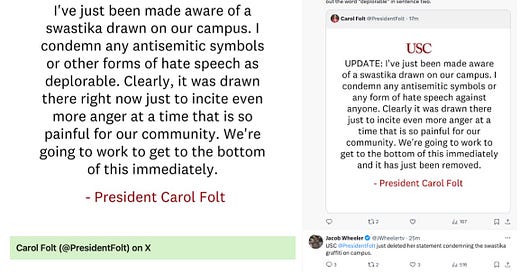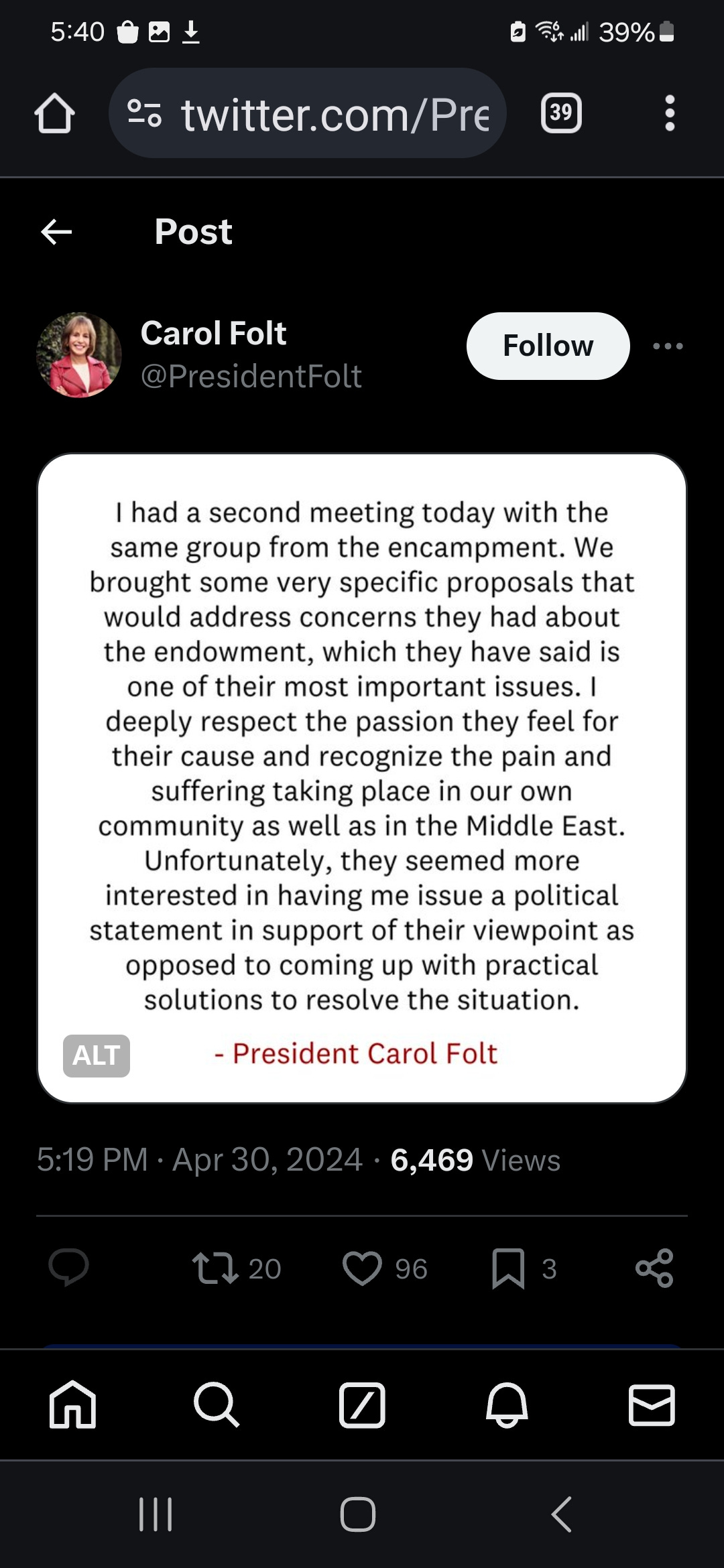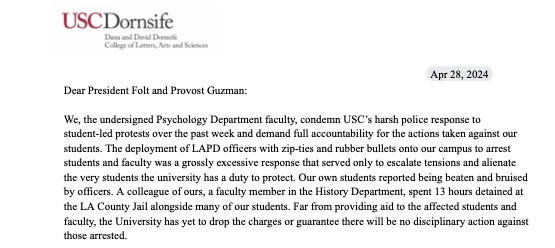Newsletter (May 1st, 2024)
Swastikas on USC campus, demands for accommodations for finals, history denial in the making, and more
Peaceful anti-Israeli protests at USC continue. As per President’s Folt tweet, a swastika was found to have been drawn on campus. In the first tweet, the President denounced this graphic expression as deplorable. In her second tweet, the word “deplorable” was removed. In a third tweet, President Folt reported on her continuing negotiations with the protestors:
According to the most recent update (7:15 pm, 04/30/2024) from the Office of the President:
I’m talking directly with our students, including two lengthy sessions with representatives from Divest from Death USC, the group that established the encampment in Alumni Park.
Patience and respect are good virtues, but in certain contexts, such as negotiations with radical extremists supporting terrorist organizations and violating university rules, decisive actions—such as arrests and expulsions—are needed. Why don’t they bring LAPD in and restore order? Why negotiate with organization called “Divest from Death”?
USC is not alone in being soft on the perpetrators. Jerry Coyne covers protests at University of Chicago. In a pair of posts, “The Encampment, Days 1 and 2: The Layout” and “‘This Dog Smells Some Rats’: The Encampment, Day 2, Post 1,” he documents the administration’s reaction, evidence of outside agitators, and how Jewish voices are being shut down.
Northwestern University has disgraced itself by reaching a deal with the protesters, and giving up multiple concessions. The midwest branch of the Anti-Defamation League has condemned the agreement:
The agreement between Northwestern University leadership and encampment organizers is reprehensible, dangerous, and a case study in failed leadership.… For days, protesters violated campus codes of conduct and policies, intentionally fanned the flames of hate and antisemitism, and wreaked havoc on campus life. Instead of holding the perpetrators accountable, the university rewarded them. It would be unbelievable if it wasn’t true.
Some protests are becoming violent. According to a JewishLivesMatter post on Instagram, a Jewish student on the UCLA campus was beaten unconscious by a group of pro-Hamas demonstrators. Jerry Coyne reports that, in response, Jewish students attacked the pro-Palestinian encampment.
Brilliant idea: at UCLA, an anonymous group has funded and constructed a giant screen with loudspeakers outside the pro-Hamas encampments showing footage of the October 7 massacre on continuous loop. We need to install dozens of these all over the campus. Some academic units could use more than one.
A word of wisdom from legal scholar Professor Robert George (Princeton):
My advice to university presidents is that your policy should be as follows: We honor freedom of speech and therefore do not impose and will not impose viewpoint-based restrictions on speech. We will, for the sake of protecting everyone's rights to teach and learn, strictly and evenhandedly (that is, in a viewpoint-neutral way) enforce the university's time, place, and manner regulations. Conduct in deliberate violation of these regulations will subject students, faculty, and staff to disciplinary proceedings. Willful violation of the regulations in defiance of a demand by university authorities or police to cease and desist will be grounds for permanent expulsion or exclusion from the university, as will violence of any kind, obstruction, disruption of classes and other university activities, destruction of property, intimidation, threats, and harassment. Due process in disciplinary proceedings will be strictly observed, with those subject to the proceedings afforded the presumption of innocence and the burden of proof being clear and convincing evidence. We reserve the right to refer criminal violations to civil authorities.
Writing for the City Journal (“Abolish Anti-Semitic Student Groups”), constitutional scholar Ilya Shapiro once again explains the distinction between protecting free expression and coddling terrorist-supporting groups. He argues that academic administrators have ample means at their disposal to crack down on impermissible disturbances and unrest without violate freedom of speech. He writes:
Long before October 7, chapters of Students for Justice in Palestine (SJP) were notorious among openly anti-Semitic pro-Palestinian groups. . . . During the 2022–23 academic year, SJP chapters were responsible for 423 of 665 documented campus anti-Israel incidents. The presence on campus of an SJP chapter is “one of the strongest predictors of perceiving a hostile climate toward Israel and Jews,” according to a 2016 study from Brandeis University’s Cohen Center for Modern Jewish Studies.
Threats, harassment, intimidation, and interference with educational programs are all lawful justifications for restricting students’ expressive activities. But can they justify disallowing student groups?
Shapiro makes a strong argument that they can.
Newsletter #6 from the Heterodox@USC group is out. It covers Valedictoriangate and quotes from our Substack and other sources. If you have not already done so, subscribe to receive a regular serving of un-sanitized news.
On institutional neutrality.
A university is a community of scholars. It is not a kindergarten; it is not a club; it is not a reform school; it is not a political party; it is not an agency of propaganda. A university is a community of scholars.
—Robert Maynard Hutchins, 1935 (see, for example, here).
The gold standard of institutional neutrality is the Kalven report. The idea is simple—universities should not act as political agents or take sides on issues of the day. This neutrality is necessary to ensure the free exchange of ideas among scholars. The importance of the Kalven principle and its implications in light of the post-2020 campus climate was discussed at this conference in Princeton. In 2023, leaders of three academic freedom organizations—the Academic Freedom Alliance, Heterodox Academy, and the Foundations for Individual Rights and Expression—issued a joint statement urging universities to adopt the Kalven principle. To learn more about this principle, see In Praise of Institutional Neutrality in Academia or this collection of posts by Jerry Coyne.
Only a handful universities have adopted the Kalven report, and USC is not one of them. However, USC does have a policy aiming to foster institutional neutrality. Specifically, the policy prohibits the expression of political statements by departments:
Political Statements and Use of University Funds
While all members of the USC community are free to express their political opinions and engage in political activities, they do so in their individual capacities. Any political statement made by a member of the USC community, including any statement taking a position or expressing an opinion in connection with proposed or current legislation, a ballot measure, proposition, regulation, law or ruling, is attributable solely to that individual, unless such statement was specifically authorized by the Office of University Relations to be made on behalf of the university.
Any faculty, staff or student with a university title should state that they are speaking as an individual and not as a representative of the university when making any political statement, unless the Office of University Relations has authorized such individual to speak on behalf of the university.
This policy was adopted to prevent another situation like the one described in one of our open letters from arising. While individual faculty members should have the freedom to sign any statement they please—whether virtuous or abhorrent—a political statement made in the name of an entire department constitutes compelled speech that intimidates dissenters, suppresses their views, and—one can argue—create a hostile work environment. In the past few days, this policy is being tested by departments issuing such statements on the matter of campus protests and international affairs. Examples include letters issued in the name of the psychology department, USC libraries, Annenberg School of Communications, Gender and Sexuality Studies, and more.
It is not absolutely clear that each of these letters violate the policy. Two of the letters purport to be written by specific undersigned department members; however, they are written on official departmental letterhead, implying that the positions taken are official departmental stances. However, the letter written “on behalf of the USC Libraries Faculty” seems to be a clearcut violation of the policy.
An email “on behalf of USC students.” Yesterday (April 30), Dornsife faculty were graced by a mass email with the subject “A Letter on Behalf of the USC Students.” Signed by the USC Divest from Death Coalition with the Student Coalition Against Labor Exploitation and United Students Against Sweatshops Local 13, it opens with familiar “We hope this letter finds you well,” regurgitates a slew of anti-Israeli tropes, praises the protesters, and then presents a list of demands, among them, accommodations for finals:
We urge you to consider implementing accommodations as a means to mitigate pressure on students who are impacted and to allow us to focus our full attention on the people of palestine [sic]. Many faculty members, who wish to remain anonymous, have already taken steps [see, for example, here] to rework their finals from traditional exams or projects to reflection papers or celebrations of the course content. Such accommodations not only acknowledge the challenges faced by students during this critical time but also demonstrate a commitment to fostering an environment that supports their well-being, academic success, and intellectual growth as conscientious global citizens. We implore you to join them in considering alternative approaches to finals that reflect USC values and allow students to fully engage with the world around them.
And from the Department of You Can’t Make This Up, USC Grad Student Union Files Unfair Labor Practice Charge Against University over Arrests.
Voices from our Circle:
Communicated by Jerry Mendel, Emeritus Professor of Electrical and Computer Engineering:
The AJC article “7 ways Hamas has conned Americans and spread hatred of Jews,” is very informative. This article should be required reading for USC students and faculty. Right now there is a lot of finger pointing at the Provost and President. But it was a Committee that made the recommendation of Asna Tabassum for Valedictorian out of 100 candidates. It is very hard to believe that this Committee did not know that it would be opening a can of worms. Perhaps there were anti-Zionist faculty on that Committee who used this choice as an opportunity to get their own feelings heard. It is that Committee that should have vetted Asna. Perhaps they did, but chose her anyway. If they did vet her, did they reveal this to the Provost? Did the Committee keep Minutes?Is there university policy that shields committee members? Many unanswered questions. It's time for that Committee to come forward and answer them.
Communicated by Professor Lucio Soibelman, Fred Champion Estate Chair in Engineering:
I don’t agree necessarily with everything that is going on in Israel but this is nothing new and is not different when compared with many other wars going on today. Since the beginning of the civil war in Syria we have more than 600,000 deaths and 7 million people leaving the country as refugees many sent to concentrations camps like the refugee camps in Lesbos Island (Moria refugee camp) in Greece. Almost 400,000 deaths in Yemen (from war and hunger because of the war manipulated by Iran and Saudi Arabia), Thousands of deaths this year in Sudan’s war. Those are wars going on now beyond Russia-Ukraine and Israel-Hamas.
Why is no one protesting those deaths too? My only explanation is that no one cares about all those deaths but they are using this as an opportunity to attack Israel and Jews all over the world.
History and its denialists
Holocaust denialists exist, but are relatively rare among professional historians. The massacre of October 7 is much more recent than the Holocaust. It is also extensively documented by the accounts of eye witnesses, survivors (see, for example, testimonials collected by the Shoah Foundation), and the perpetrators themselves. Yet, there are scholars who question whether the atrocities took place. For example, they contest the factual accuracy of Hamas’s sexual violence and barbaric brutality against Israel civilians. The article “Journalism Professors: NYT Risks Credibility With Inaction on Oct. 7 Article” criticizes the NYT for publishing the story “‘Screams Without Words’: Sexual Violence on Oct. 7” (see also the documentary by Sheryl Sandberg, Screams Before Silence).
This is what honest journalists write:
The story, entitled “‘Screams Without Words’: Sexual Violence on Oct. 7,” was widely circulated after its publication in December and has been used by government officials and Zionist groups to supposedly justify Israel’s genocidal brutality against Palestinians in Gaza.
The story made a number of allegations about systemic sexual and gender-based violence against Israeli women by Hamas fighters during the October 7 attack. But investigations by The Intercept and testimony reported on by other journalists found that Times journalists internally questioned the quality of the reporting behind “Screams Without Words,” raising concerns that it didn’t meet the paper’s standards for evidence and fact-gathering and rather served to boost the paper’s pro-Israel slant.
Dozens of tenured journalism professors at top schools across the U.S. have raised concerns that The New York Times is risking its own credibility, as well as the credibility of journalism at large, with its inaction on an article about sexual violence on October 7 that has come under scrutiny in recent months due to its reliance on questionable — and, in some cases, debunked — evidence.
Who are these “dozens of tenured journalism professors at top schools”? The article refers to a letter signed by the group of over 50 professors. There are 13 USC faculty among the signatories. We need to get these giant screens installed on campus ASAP—Annenberg needs at least two.
And, to conclude, some good news:
A very talented PR student has been named the new Noemi Pollack Scholar by Annenberg. Read more about her here.
Our Open Letter to the USC Academic Senate has more than 80 signatories and has been read more than 1,000 times since publication on April 29.










Hamas is conducting this war in press. And there are plenty of useful idiots happy to help.